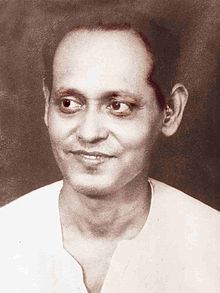Subodh Banerjee | |
|---|---|
 | |
| PWD Minister of West Bengal (1969), Labour Minister of West Bengal (1967), MLA (1952–1972) | |
| Constituency | Jaynagar |
| Personal details | |
| Born | 1918 Jaynagar Majilpur, Bengal Presidency, British India |
| Died | 16 September 1974 (aged 55–56) Calcutta, West Bengal, India |
| Political party | Socialist Unity Centre of India |
Subodh Banerjee (1918 – 16 September 1974)[1] was an Indian politician, belonging to the Socialist Unity Centre of India. He introduced the Gherao principle as a formal mode of protest in the trade union sector of India while being the Labour Minister in the 1967 United Front Government in West Bengal.[2][3][4] He was the PWD minister in the 1969 United Front Government of West Bengal. His lasting contribution was the removal of all statutes of "guardians and rulers" of the British Indian empire from public places in Kolkata. However, he appreciated the artistic value of many of them and stored them in some other public places not in the public view. He was called the Gherao minister[2] and was recognised both by his friends and detractors as a 'scrupulously honest minister and a firebrand labour leader with incendiary oratorical skill'.[3]
He was a member of the Central Committee of the SUCI and the first MLA of the party.[5]
He represented the Jaynagar assembly constituency of West Bengal.
A auditorium has been made for the memory of his and Sachin Banerjee in Jaynagar by naming 'Sachin Banerjee-Subodh Banerjee Bhaban.[6][7]
- ^ Proceedings of the Winter Session of the Meghalaya Legislative Assembly held at 9 a. m. on Friday, the 6 December 1974 in the Assembly Chambers, Shillong
- ^ a b West Bengal's Jyothi Basu – A political people, p. 27
- ^ a b A Defiant Rebel
- ^ Populist Governance
- ^ How much do you know about SUCI
- ^ "জয়নগরে শচীন ব্যানার্জী-সুবোধ ব্যানার্জী ভবন উদ্বোধন -". Retrieved 16 September 2023.
- ^ চক্রবর্তী, বিপাশা (31 August 2023). "জয়নগরে শচীন ব্যানার্জী সুবোধ ব্যানার্জী অডিটোরিয়ামের উদ্বোধন". Puber Kalom. Retrieved 16 September 2023.